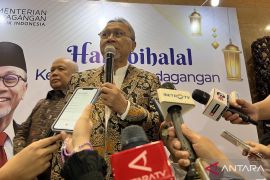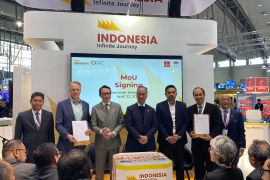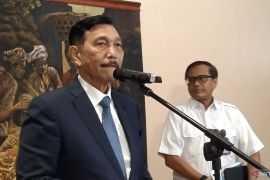"Indonesia has, and will always, stand by Palestinian people in their fight for their right to build an independent and sovereign state with Jerusalem as its capital city," Foreign Affairs Minister Retno L. P. Marsudi said.Jakarta News (Antara) -- The Indonesian government organized an international seminar themed "Unwavering Support of Indonesia to Palestine and the Role of the United Nations" at the office of the foreign ministry on November 28, 2014.
The event, which included a photo exhibition dubbed "Our Hearts, Our Minds and Our Hands," was held to observe the International Day of Solidarity with Palestinian People that falls on November 29.
"Indonesia has, and will always, stand by Palestinian people in their fight for their right to build an independent and sovereign state with Jerusalem as its capital city," Foreign Affairs Minister Retno L. P. Marsudi said in her opening remarks.
The minister explained that the firm support of the government of Indonesia for Palestine is in line with the countrys national constitution, wherein its preamble states that independence is the right of all nations, and therefore, all kinds of colonization on earth must be eradicated as it goes against humanity and justice.
"In line with the vision and mission of the Indonesian government, under the leadership of President Joko Widodo, I would like to reaffirm that the Palestinian issue will continue to be one of the priorities in our foreign policy," she stated.
Relations between Indonesia and Palestine have been in place since the formers independence. Syeikh Muhammad Amin Al-Husaini from Palestine expressed his support to Indonesias independence several decades ago. He convinced leaders in the Middle East to recognize the independence of the Republic of Indonesia, she noted.
"He also attended the Asia-Africa Conference in Bandung in April 1955," Marsudi added.
In view of that, she noted that Indonesia was very concerned that Palestine was the only nation at the Asia-Africa Conference that has yet to gain complete independence until today.
Indonesia is one of the countries that recognized the Palestinian state immediately after it declared its independence on November 15, 1988, and a year later, it initiated diplomatic relations with Palestine.
Indonesia will continue to join the international community in carrying out joint efforts to put an end to Israels occupation of Palestinian territories, she affirmed.
"Indonesia fully supports the vision of a two-state solution based on which an independent, sovereign and democratic Palestine can co-exist with neighboring countries peacefully," she said.
Marsudi, however, considered Israels unilateral policies in the occupied Palestinian territories as a hindrance to the creation of peace and the two-state solution.
"Israels policy and practices in the occupied Palestinian territories, including the development of illegal settlements and separation walls and the imposition of limits on Palestinians rights, are the biggest hindrances to the creation of peace," she remarked.
The development of Jewish settlements in east Jerusalem is a violation of international law and human rights rules, she pointed out.
"It is terrible that even though the U. N. General Assembly declared this year as the year of International Solidarity with Palestinian People, Israel continues to carry out illegal activities in the occupied Palestinian territories," she opined.
Earlier, President Jokowi expressed optimism that the United Nations could play a more concrete role in helping Palestine become a sovereign state.
"We conveyed that we fully support Palestines independence and hope the U. N. will play a more concrete role," President Jokowi told the press following a meeting with U. N. Secretary General Ban Ki-moon on the sidelines of the ASEAN Summit in Nay Pyi Taw, Myanmar, on November 13.
The foreign affairs minister, in her speech at the seminar, reiterated Indonesias plan to appoint an honorary consulate in Ramallah, Palestine. The plan was earlier announced by Director General of Multilateral Cooperation Hasan Kleib in October.
The honorary consulate in Ramallah could be a stepping stone towards going ahead and establishing an official Embassy of Indonesia in Palestine, which President Jokowi mentioned as part of his vision for Indonesian diplomatic policy during the 2014 presidential elections, Kleib noted.
"To have an honorary consul, we can appoint a Palestinian or Indonesian who is domiciled in Palestine. It could be anyone---a tradesman, a businessman, or even a medical worker. However, it is of utmost importance that s/he is not attached with politics," he explained.
The honorary consulate would not have political authority; he will only be able to facilitate visa applications for Indonesian citizens to arrive in Ramallah through the Indonesian Embassy in Jordan.
"His authority is to report visa applications. He has no political function, similar to a general consulates function in the economic, social and cultural fields," the senior diplomat affirmed.
With escalating tensions in the occupied territories of both Gaza and West Bank due to violence and violations by illegal Israeli settlers and security officers, the Indonesian Committee for Palestinian Solidarity (KISPA) on November 14 urged President Jokowi to fulfill his presidential election campaign pledge to take a concrete step to defend Palestine.
"We urge the Indonesian government to realize its campaign pledge and take a concrete step to defend the Palestinian state and the Al-Aqsa Mosque," KISPA Chairman Ferry Nur said in a press statement.
The Israeli treatment of Palestinian people went beyond the limit of humanity when they denied them entry into the Al-Aqsa Mosque to perform their prayers, he remarked.
"Closing the Al-Aqsa Mosque and denying access to Muslims to the worship house to perform prayers is a violation of human rights," Nur explained.
KISPA also called on Muslims the world over to unite in defending the Palestinian state by giving moral and material support.
"Let us assist Palestinian people in their struggle to gain true independence so they will be free from human rights violations," he reiterated.
The International Day of Solidarity with Palestinian People is observed by the United Nations on or around November 29 every year. This is in accordance with mandates issued by the General Assembly in its resolutions 32/40 B of December 2, 1977, 34/65 D of December 12, 1979, and subsequent resolutions adopted by the General Assembly with regard to Palestine.
The date of November 29 was chosen because of its meaning and significance to Palestinian people. On that day in 1947, the General Assembly adopted resolution 181 (II), which came to be known as the Partition Resolution.
This resolution provided for the establishment of a "Jewish State" and an "Arab State" in Palestine, with Jerusalem as a corpus separatum under a special international regime. Of the two states to be created under this resolution, only one---Israel---has come into being as an independent and sovereign state so far.
The solidarity day provides an opportunity for the international community to focus its attention on the fact that the question of Palestine is still unresolved and that Palestinian people have yet to attain their inalienable rights, as defined by the U. N. General Assembly. These include the right to self-determination without external interference, the right to national independence and sovereignty, and the right to return to their homes and property from which they had been displaced. (*)
(f001/INE/a014)
Reporter: Fardah
Editor: Fardah Assegaf
Copyright © ANTARA 2014











